PYTHAGOREAN THEOREM
Subscribe to our ▶️ YouTube channel 🔴 for the latest videos, updates, and tips.
In this section, we are going to study one of the most famous theorems in mathematics — the Pythagorean Theorem. The relationship it describes has been known for thousands of years.
Theorem :
In a right triangle, the square of the length of the hypotenuse is equal to the sum of the squares of the lengths of the other two legs.
It has been illustrated in the diagram shown below.
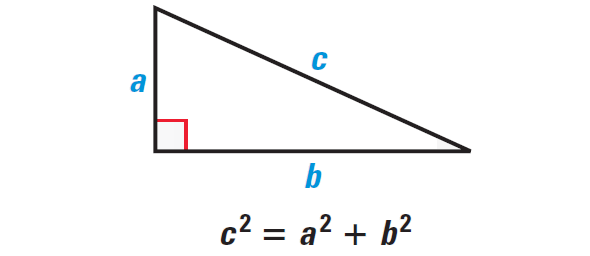
Proving the Pythagorean Theorem
There are many different proofs of the Pythagorean Theorem. One is shown below.
Given : In ΔABC, ∠BCA is a right angle.
Prove : a2 + b2 = c2
Plan for Proof :
Draw altitude CD to the hypotenuse. Then apply Geometric Mean Theorem, which states that when the altitude is drawn to the hypotenuse of a right triangle, each leg of the right triangle is the geometric mean of the hypotenuse and the segment of the hypotenuse that is adjacent to that leg.
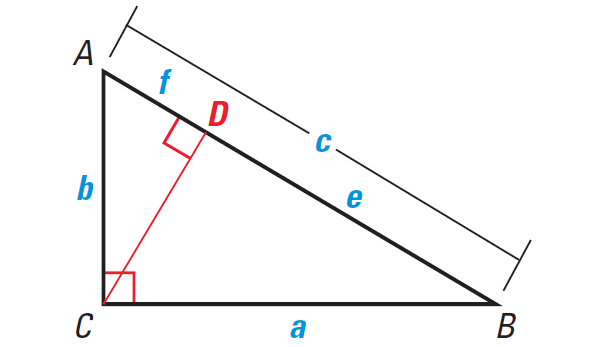
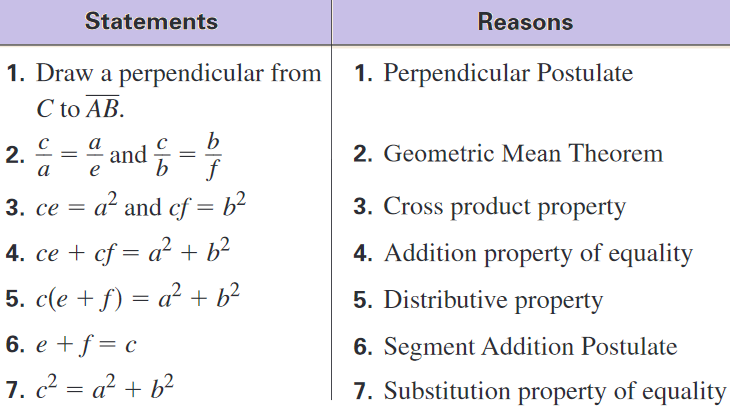
Using Pythagorean Theorem
A Pythagorean triple is a set of three positive integers a, b, and c that satisfy the equation
c2 = a2 + b2
For example, the integers 3, 4 and 5 form a Pythagorean triple.
Because,
52 = 32 + 42
Finding the Length of a Hypotenuse
Example 1 :
Find the length of the hypotenuse of the right triangle shown below. Tell whether the side lengths form a Pythagorean triple.

Solution :
By Pythagorean Theorem, we have
(Hypotenuse)2 = (leg)2 + (leg)2
Substitute.
x2 = 52 + 122
Simplify.
x2 = 25 + 144
x2 = 169
Take square root on each side.
√x2 = √169
x = 13
So, the length of the hypotenuse is 13 units.
Because 132 = 122 + 52, they form a Pythagorean triple.
Finding the Length of a Leg
Example 2 :
Find the length of the leg of the right triangle shown below.

Solution :
By Pythagorean Theorem, we have
(Hypotenuse)2 = (leg)2 + (leg)2
Substitute.
142 = 72 + x2
Simplify.
196 = 49 + x2
Subtract 49 from each side.
147 = x2
Take square root on each side.
√147 = √x2
√147 = x
Use product property.
√49 ⋅ √3 = x
Simplify the radical.
7√3 = x
Hence, the required side length is 7√3 units.
Finding the Area of a Triangle
Example 3 :
Find the area of the triangle to the nearest tenth of a meter.
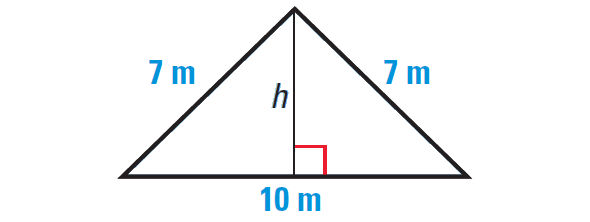
Solution :
We are given that the base of the triangle is 10 meters, but we do not know the height h.
Because the triangle is isosceles, it can be divided into two congruent right triangles with the given dimensions. Use the Pythagorean Theorem to find the value of h.
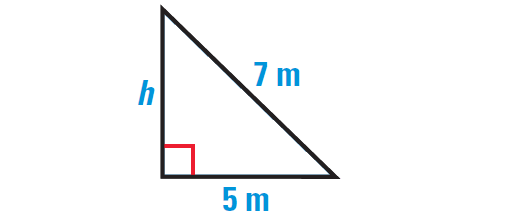
By Pythagorean Theorem, we have
72 = 52 + h2
Simplify.
49 = 25 + h2
Subtract 25 from each side.
24 = h2
Take square root on each side.
√24 = √h2
√24 = h
Now find the area of the original triangle.
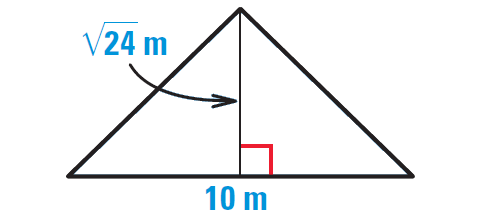
Area = 1/2 ⋅ b ⋅ h
Substitute.
Area = 1/2 ⋅ 10 ⋅ √24
Use calculator to approximate.
Area = 1/2 ⋅ 10 ⋅ √24
Area ≈ 24.5 m2
Hence, the area of the triangle is about 24.5 m2.
Subscribe to our ▶️ YouTube channel 🔴 for the latest videos, updates, and tips.
Kindly mail your feedback to v4formath@gmail.com
We always appreciate your feedback.
About Us | Contact Us | Privacy Policy
©All rights reserved. onlinemath4all.com

Recent Articles
-
SAT Math Problems and Solutions
Feb 14, 26 06:05 AM
SAT Math Problems and Solutions -
SAT Math Practice Questions with Answers
Feb 14, 26 05:47 AM
SAT Math Practice Questions with Answers -
SAT Math Practice Test with Answers
Feb 14, 26 02:30 AM
SAT Math Practice Test with Answers

